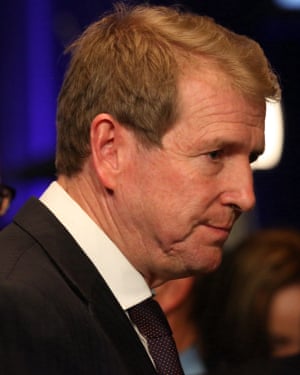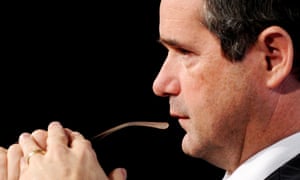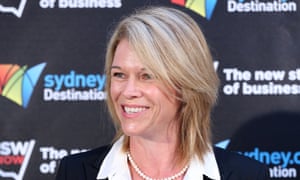Extract from The Guardian
Katrina Hodgkinson and Larry Anthony – as well key Labor and Liberal figures – are part of an industry with little oversight
The two most powerful figures in the National party
executive simultaneously hold senior roles with lobbying firms that
push the interests of big business, including banks, oil and coal
companies, payday lenders and the multinational contractor Serco.
Guardian Australia has confirmed that the party’s newly elected federal vice-president, Katrina Hodgkinson, has remained in a second role as corporate counsel for one of Australia’s most powerful lobbying firms, Barton Deakin.
It follows concerns raised last year about the dual roles held by the National party president, Larry Anthony, who is also a co-owner and director of SAS Group, which has at times represented the oil giant Santos and Delta Electricity, among others.
Hodgkinson became the Nationals’ federal vice-president last month. She was registered as a third-party lobbyist with Barton Deakin until recently, but removed herself from various lobbyist registers before nominating for the Nationals’ post.

Guardian Australia has confirmed that the party’s newly elected federal vice-president, Katrina Hodgkinson, has remained in a second role as corporate counsel for one of Australia’s most powerful lobbying firms, Barton Deakin.
It follows concerns raised last year about the dual roles held by the National party president, Larry Anthony, who is also a co-owner and director of SAS Group, which has at times represented the oil giant Santos and Delta Electricity, among others.
Hodgkinson became the Nationals’ federal vice-president last month. She was registered as a third-party lobbyist with Barton Deakin until recently, but removed herself from various lobbyist registers before nominating for the Nationals’ post.

She remains Barton Deakin’s corporate counsel, and her online biography says she brings “a wealth of experience and contacts to the Barton Deakin team, gathered over 30 years in both the private and public sectors”.
The lobbying firm lists Serco among its clients, as well as the energy company AGL, Nucoal Resources and the payday lender Rent4keeps, which is part of a sector that has lobbied to stave off a regulatory crackdown on bad behaviour.
Hodgkinson and Anthony both say they do not engage in lobbying activities in their current roles. Hodgkinson, as corporate counsel, says her work is internal in nature.
“A casual vacancy for vice-president of the Nationals arose,” Hodgkinson said. “I came off all registries upon nominating for the role.
“Barton Deakin follows the rules of the code of conduct. The work I do at the company is internal and advisory in nature.”
In at least one circumstance, the National party has actively hurt a client of Hodgkinson’s firm. Pressure from Nationals backbenchers helped force the Turnbull government to constitute the banking royal commission, where AMP’s reputation was torn to shreds.
A spokesman for the SAS Group – which is a broader communications consultancy, not simply a lobbying firm – rejected any suggestion of impropriety by Anthony.
“Our success is not built on the standing of a single director,” he said. “We note that while there has been some media interest over the last 12 months in Larry Anthony’s volunteer role as federal Nationals president, there has been no allegation of impropriety made against him or the firm in that time.”
The issue is hardly unique to the Nationals. Party powerbrokers within Labor and the Liberals have also simultaneously held roles as lobbyists.

Sitting on the executive of a party can afford an individual significant power. Executives can wield influence over party policy, fundraising and the organising of campaigns and preselection. They can influence factions, have greater access to MPs and can receive information and research not available to the wider public.
The Labor powerbroker and former communications minister Stephen Conroy is the executive director of Responsible Wagering Australia, an online gambling industry peak group backed by Unibet, Bet365 and Crownbet, among others.
Conroy also sits on Labor’s national executive, and Guardian Australia has confirmed he has been re-elected to Victoria’s 100-member public office selections committee, which helps preselect candidates.
He is in breach of no rules, either of the federal or state lobbying codes, or the party. He is directly employed by the peak body and is therefore not defined as a lobbyist under the federal or Victorian codes.
Conroy also told Guardian Australia he has not attended a meeting of either the executive or the public office selections committee for roughly 18 months. He said he uses a proxy.
“I comply with all state and federal laws and I comply with all state and federal ALP rules,” Conroy said. “And to further avoid any doubt, I haven’t attended a meeting for a year and a half and proxy myself out.”
The move prompted the political lobbyists Joe Tannous and Michael Photios to quit their roles on the Liberal party’s New South Wales executive.
The federal lobbying code does stipulate that third-party lobbyists must not sit on a “state or federal political party executive, state executive or administrative committee”. But one of Australia’s leading lobbying experts, the University of Melbourne academic George Rennie, said individuals were only required to remove themselves from the register to avoid a breach. He said it made a “mockery of the code”, which was weak and largely unenforced.
“The flimsiness of the code means they’re safe,” Rennie told Guardian Australia. “They’re safe from the flimsy code.”
Rennie said the code of conduct carried no real punishments, even if someone were to be found in breach. He said the worst the prime minister’s department could do was remove someone from the register.
Last year, after Fairfax Media reported on Anthony’s dual roles, Labor wrote to the Department of the Prime Minister and Cabinet to voice its concern.
Senator Don Farrell asked the department to investigate Anthony’s situation. He said it made a mockery of the code.
“This matter raises serious concerns and it must be addressed as a matter of urgency,” Farrell wrote.
Farrell’s office said it never received a response.
• This reporting is supported by the Susan McKinnon Foundation through the Guardian Civic Journalism Trust


No comments:
Post a Comment